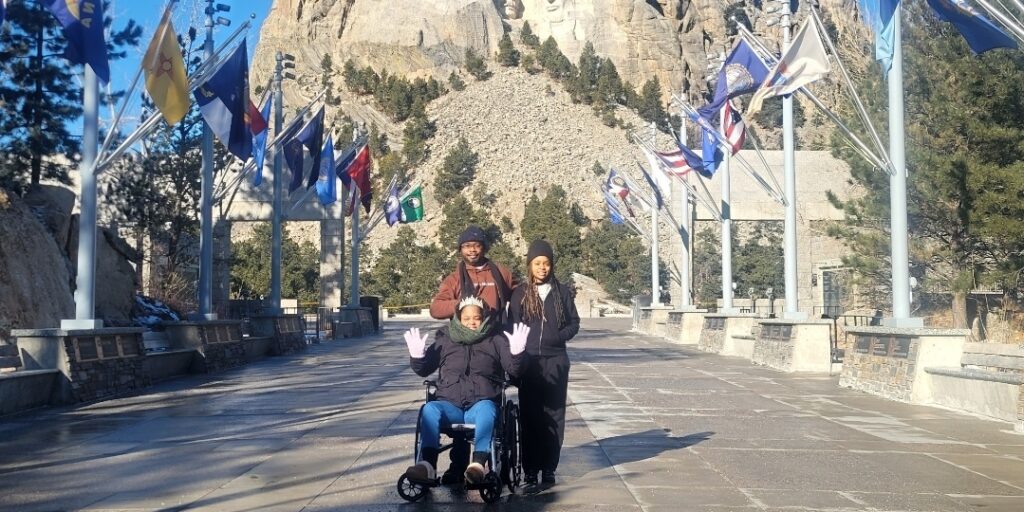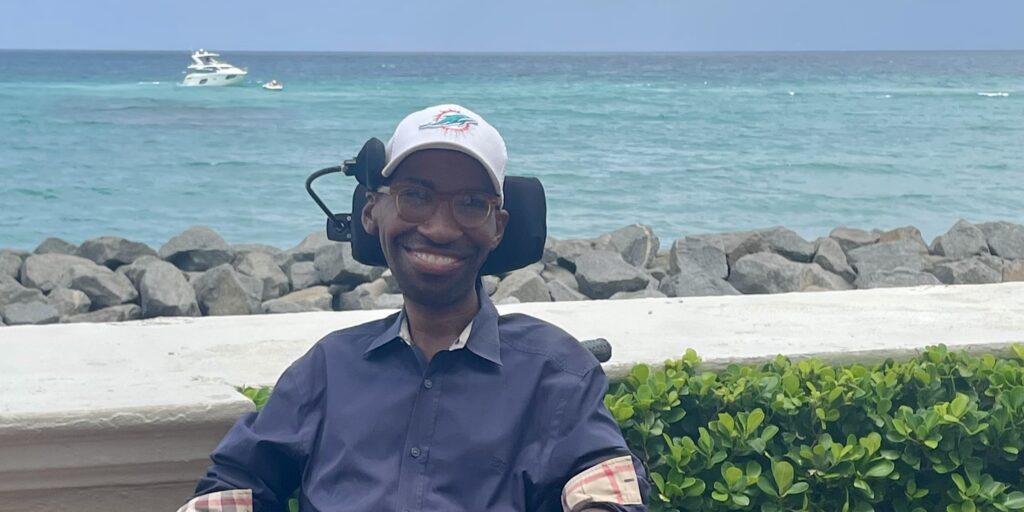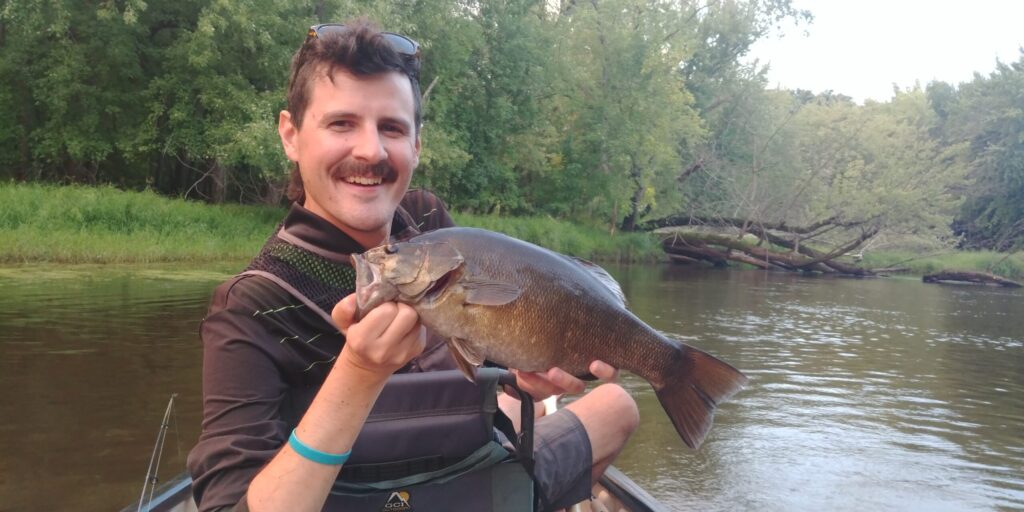
MDA Ambassador Guest Blog: Embracing Adventure (with a Little Help from My Friends)
By Travis Rasmussen | Tuesday, April 2, 2024
5 Second Summary
MDA Ambassadors play an essential role in furthering MDA’s mission while representing and empowering the neuromuscular disease community. Quest Ambassador Guest Blog series provides a platform to share their personal stories, perspectives, and experience.
Travis Rasmussen is 30 years old. He lives in Wisconsin, but will soon move to Virginia to live with his brother, Tyler. Travis was diagnosed with spinal muscular atrophy (SMA) type 3 at age 3. He is mostly independent, but needs support with certain things and uses a wheelchair when traveling long distances, like at the airport or a museum. Travis enjoys playing drums, hardcore gaming, being outdoors, reading, and watching movies (but only while eating popcorn).
As the youngest of five children, I was always naturally drawn to the things that my siblings were interested in. Especially the interests of my oldest brother, an avid fisherman, and my second oldest brother, a musician. One made me fall in love with the outdoors and the other with my instrument, the drums. These passions, along with a shared passion for video games, pretty much determined what my future hobbies were going to be.
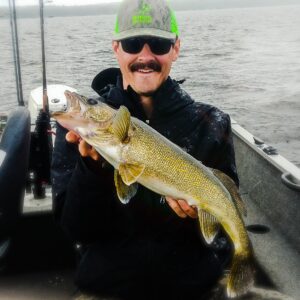
Catching walleye on Lake Kabetogama in the rain.”
I can remember lying in my bottom bunk bed as a twelve-year-old child, listening to music on my headphones and trying to move my hands and feet along with the drums. It wasn’t long before I convinced my mother to buy me a drum set – a Gretsch Nighthawk. It was definitely nothing to write home about, but it was certainly a treat for a small kid with big dreams! I beat the heck out of that kit for years. At the time, I wanted nothing more than to be a rockstar, but there was just one small problem.
When I was three years old, I was diagnosed with spinal muscular atrophy (SMA) Type III. For me, SMA was, and still is, a ‘slow burn’ kind of condition. During my teenage years, it didn’t really stop me from being independent and therefore didn’t make me worry too much for the future. I still had the strength and energy to power through concerts and drum practices and I could still enjoy most outdoor activities and adventures without worry.
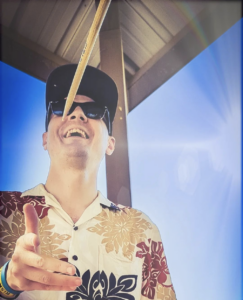
Even vacation won’t stop me from drum practice.
At eighteen, after high school but before college, I went on a 16-day tour from Minnesota to Florida (and everywhere in between) with a band that I was in. I consider this to be my life’s second greatest adventure and I am glad to have had the opportunity while I was still mostly independent and mobile. Of course, I needed help with some things, I did have SMA after all. I am lucky to have made friends that offered support and helped to ensure that I could travel with the band.
It took me a long time to realize the power of these friendships. I was so stubborn in my quest to remain independent that as my condition progressed, I would often forgo the opportunity for adventure to spare myself potential embarrassment. I didn’t feel comfortable asking for help. I began to think that because I was physically no longer able to do certain things that I was no longer able to do any of the things that I loved. My passions began to lack luster. At some point in my early twenties, I began to think that my condition meant the end of all the things that I found joy in. With that mindset, I began to just do, well, nearly nothing at all.
New treatments and advances in therapies for SMA were certainly a catalyst of change for me. New treatments brought hope for the future. That hope led me to realize something that had been true all along: there is always a way.
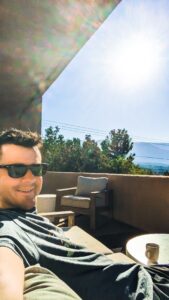
Enjoying the morning in beautiful Sedona Arizona.
I began to understand why all of my teachers and counselors were constantly telling me to ‘advocate for myself’: because if there is something that you want to do but you cannot do it yourself, asking for help is the best way to get it. Once I got over the fear of asking for help, I was able to become part of the world again! I needed help getting in and out of a boat to go fishing. I needed help navigating the airport for travel. But by asking for help, I was able to do these things again. Turns out, if you ask, there are those who are willing to help. In fact, most people are!
The last few years have been filled with adventure for me. I’ve spent so much time on the water making memories that will last forever. I’ve been on airplanes more times in the last year than I had in my whole life – seeing places that I’d never seen before. And I’ve found a passion again for music, learning that technique and practice trumps strength and range of motion any day. I’ve developed more skill in the last three years than the entire decade before.
I now find excitement in something that I know will be challenging because of my disability, knowing that I can overcome those challenges. I look forward to new adventures and, perhaps recklessly, accept new opportunities. Every day, I strive to learn new things and improve the skills I have.
Finding ways to do the things I love fundamentally changed my perspective on the world. It made me realize that there is so much to experience, explore, and learn. And that a disability like SMA is not a barrier to the world, merely a gate. And that gate can easily be opened with a little courage, creativity, and sometimes a helping hand. All you have to do is simply ask ‘how’ and the world will promptly answer. Then, just do.
Next Steps and Useful Resources
- Learn more about living independently with a disability.
- For more information about the signs and symptoms of Spinal muscular atrophy (SMA), as well an overview of diagnosis and treatment concerns, an in-depth review can be found here.
- MDA’s Resource Center provides support, guidance, and resources for patients and families. Contact the MDA Resource Center at 1-833-ASK-MDA1 or ResourceCenter@mdausa.org
- Stay up-to-date on Quest content! Subscribe to Quest Magazine and Newsletter.
TAGS: Ambassador Guest Blog, Ambassadors
TYPE: Blog Post
Disclaimer: No content on this site should ever be used as a substitute for direct medical advice from your doctor or other qualified clinician.


